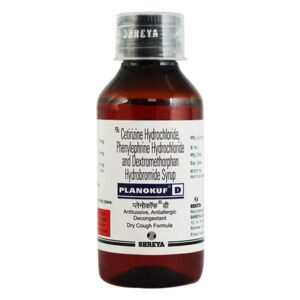DEXTROMETHORPHAN + PHENYLEPHRINE + CETRIZINE
Dextromethorphan: Dextromethorphan is a medication commonly used as a cough suppressant. It is found in many over-the-counter cough syrups and throat lozenges.
The primary mechanism of action of dextromethorphan is to act on the cough reflex center in the brain, inhibiting the urge to cough. It works by binding to and blocking the NMDA receptors, which are involved in the transmission of pain and cough signals. Additionally, it also acts as a weak serotonin reuptake inhibitor, which may contribute to its cough-suppressing effects.
The dose of dextromethorphan varies depending on the formulation and the age of the patient. For adults and children above 12 years old, the typical recommended dose is 10-20 mg every 4-6 hours, with a maximum daily dose of 120 mg. For children between 6 and 12 years old, the recommended dose is 5-10 mg every 4-6 hours, with a maximum daily dose of 60 mg. It is important to carefully follow the dosing instructions on the package or as directed by a healthcare professional.
Common side effects of dextromethorphan include drowsiness, dizziness, nausea, and gastrointestinal upset. Some individuals may also experience confusion, hallucinations, or disorientation at higher doses. It is worth noting that dextromethorphan can interact with certain medications, such as antidepressants, and can cause serotonin syndrome when combined with these drugs. It is important to consult a healthcare professional or pharmacist before using dextromethorphan, especially if taking other medications.
In rare cases, dextromethorphan abuse can lead to psychological dependence and addiction. Due to this potential for misuse and abuse, some countries have restricted the sale of dextromethorphan-containing products to prevent misuse, particularly by teenagers seeking a recreational “high.”
It is crucial to use dextromethorphan as directed and to consult a healthcare professional if symptoms persist or worsen.
Phenylephrine: Phenylephrine is a medication commonly used as a decongestant to relieve nasal congestion caused by allergies, colds, or sinusitis. It works by narrowing the blood vessels in the nasal passages, which helps to reduce swelling and congestion.
The main mechanism of action of phenylephrine is its ability to selectively stimulate alpha-adrenergic receptors in the blood vessels of the nasal mucosa. This leads to vasoconstriction and decreases the volume of blood flow, thereby reducing congestion.
Phenylephrine is available in various forms, including nasal sprays, eye drops, oral tablets, and as an ingredient in combination with other medications. The recommended dose and frequency of use may vary depending on the specific product and individual needs. It is important to follow the instructions provided by a healthcare professional or the product label.
Common side effects of phenylephrine use include temporary burning, stinging, or dryness in the nasal passages, as well as nasal irritation or sneezing. Some individuals may also experience headache, dizziness, increased heart rate, or elevated blood pressure. These side effects are generally mild and go away on their own without any specific treatment.
However, it is important to note that phenylephrine should be used with caution in individuals with certain medical conditions, such as high blood pressure, heart disease, diabetes, thyroid problems, or prostate enlargement. It is always recommended to consult a healthcare professional before using phenylephrine, especially if one has any underlying health conditions or is taking other medications.
Cetrizine: Cetrizine, also known by its brand name Zyrtec, is an antihistamine medication used to relieve symptoms associated with allergic conditions such as hay fever, allergic rhinitis, and hives.
The drug works by blocking the action of histamine, a substance in the body that triggers allergic reactions. By inhibiting histamine activity, cetrizine reduces symptoms such as sneezing, itching, runny nose, and watery eyes.
Cetrizine is usually taken orally in the form of tablets or as a syrup. The typical recommended dose for adults and children 6 years and older is 5-10 mg once daily, while children aged 2-6 years usually take 2.5-5 mg once daily. Dosage adjustments may be necessary for individuals with impaired kidney function.
While generally considered safe, cetrizine may cause some side effects. Common side effects include drowsiness, dry mouth, headache, and fatigue. These effects are usually mild and transient. In some cases, cetrizine may also cause gastrointestinal symptoms such as nausea, vomiting, and diarrhea. Rarely, more serious side effects such as allergic reactions, difficulty breathing, and rapid heart rate may occur. It is important to seek medical attention if any severe or unusual symptoms occur.
Cetrizine should be used with caution in individuals with certain medical conditions, such as liver or kidney impairment. It is also important to note that cetrizine may interact with other medications, including sedatives and tranquilizers, increasing the risk of drowsiness and sedation. It is advisable to consult a healthcare professional or pharmacist before starting cetrizine or if taking other medications concurrently.
Overall, cetrizine is a widely used antihistamine that effectively relieves allergic symptoms. However, it is important to follow the recommended dosage and consult a healthcare professional if any concerns or side effects arise.

